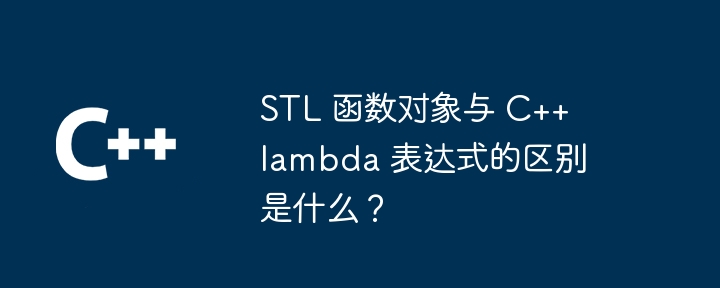Home >Backend Development >C++ >What is the difference between STL function objects and C++ lambda expressions?
What is the difference between STL function objects and C++ lambda expressions?
- PHPzOriginal
- 2024-04-25 12:18:01676browse
Function objects and lambda expressions are both tools for creating anonymous functions. The main differences are: Syntax: Function objects use class definitions, while lambda expressions use [] syntax. Scope: Function objects can be used outside the class, whereas lambda expressions are limited to the scope of definition. Capture: Function objects cannot capture external variables, but lambda expressions can capture through capture lists. Overhead: Function object creation overhead is low, lambda expression overhead is high. Reusability: Function objects are usually reusable, lambda expressions are usually single-use.

The difference between STL function objects and C lambda expressions
Function objects and lambda expressions are both used to create in C Tools for anonymous functions. While they have similarities, there are also key differences:
Syntax
- Function objects: Use classes to declare.
-
lambda expression: Use
[]syntax definition.
Scope
- Function object: Can be used outside the class.
- lambda expressions: are only valid within the scope in which they are defined.
Capture
- Function object: Cannot capture external variables.
- lambda expression: External variables can be captured through the capture list.
Overhead
- Function object: Low creation overhead.
- lambda expression: High overhead to create because it requires generating a closure.
Reusability
- Function objects: Usually reusable.
- lambda expression: Usually a one-time use.
Practical Case
Suppose we have an array of integers and we want to find the first element that meets a certain condition (for example, the first one is greater than 10 Elements).
Using a function object:
class GreaterThan10 {
public:
bool operator()(int x) { return x > 10; }
};
int main() {
int arr[] = {1, 5, 7, 12, 14};
auto found = find_if(begin(arr), end(arr), GreaterThan10());
if (found != end(arr)) {
cout << "First number greater than 10: " << *found << endl;
}
return 0;
}Using a lambda expression:
int main() {
int arr[] = {1, 5, 7, 12, 14};
auto found = find_if(begin(arr), end(arr), [](int x) { return x > 10; });
if (found != end(arr)) {
cout << "First number greater than 10: " << *found << endl;
}
return 0;
}In this example, the lambda expression is Create an anonymous function that determines whether the integer is greater than 10.
The above is the detailed content of What is the difference between STL function objects and C++ lambda expressions?. For more information, please follow other related articles on the PHP Chinese website!

